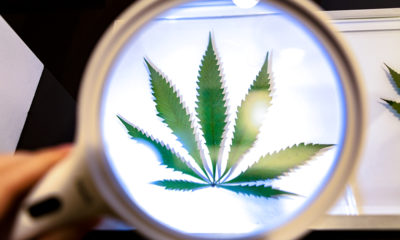Medical
The Current State of Marijuana’s Drug Classification
Photo by Dave Lobby
The only marijuana available for research in the United States has remained locked down by the FDA since 1970.
Marijuana is classified as a Schedule I drug, meaning cannabis regarded as highly addictive with no medicinal benefits. Currently, $3 out of every $4 allocated for drug experimentation in the federal budget ($69 million in the 2014 fiscal year) goes to studying abuse and addiction.
The National Institute of Drug Abuse (NIDA) contracts with the University of Mississippi to grow the only marijuana approved for research. To obtain any marijuana grown at the college, scientists must be working on a project funded by the National Institutes of Health (NIH) or pass review by a Department of Health and Human Services panel.
As a point of reference NIDA is part of the NIH, which is a branch of the Department of Health and Human Services.
Recently, Nora Volkow, director of the National Institute on Drug Abuse told Bloomberg, marijuana is a trend that “will peak like tobacco then people will see their error… We’re trying to do what interventions we can do now because we don’t want to wait until it’s proven harmful.”
On the other side, marijuana advocates have said these restrictions make it nearly impossible for any research to be conducted.
Dan Riffle, director of federal policies at the Marijuana Policy Project, countered Volkow’s statement by saying the federal researchers aren’t “set up to study potential medical benefits, so it’s inappropriate for NIDA to have a monopoly on supply.”
Groups like the Marijuana Policy Project and the Multidisciplinary Association for Psychedelic Studies are pushing for the DEA to grant additional licenses to grow research marijuana. In addition, national organizations, such as the Epilepsy Foundation, have called for an end to DEA restrictions that limit research on marijuana’s effect on seizures.
When a study is approved for beneficial research, scientists often discover additional hurdles. This was the case for Rick Doblin, founder and executive director of the psychedelic studies association. After a three-year battle to get a study approved to research the effects of marijuana on veterans with PTSD Doblin found there will not be enough marijuana to conduct his study until 2015.
“I think we need all sorts of research into the risks of marijuana,” Doblin told Bloomberg. “But what’s unbalanced is the obstruction of research into the benefits of marijuana.”
The FDA is now reviewing marijuana for the third time, to see whether it may be downgraded from a Schedule I drug. The first two reviews took place in 2001 and 2006.
Continuous petitions to the FDA to downgrade the drug since the last analysis have resulted in a conducting a eight-factor analysis which include potential for abuse; evidence of pharmacological effects; the state of current scientific knowledge regarding marijuana; the history and current patterns of abuse; the scope and significance of abuse; potential risks to the public; physiological dependence liability and whether marijuana is a precursor of another controlled substance.
One factor, particularly the state of current scientific knowledge of marijuana, has been hotly contested by marijuana advocates who believe that may be a large reason marijuana has not yet been downgraded.
“We’re stuck in a Catch-22,” Tamar Todd, senior staff attorney for the Drug Policy Alliance said last year. “The DEA is saying that marijuana needs FDA approval to be removed from Schedule I, but at the same time they are obstructing that very research. While there is a plethora of scientific evidence establishing marijuana’s safety and efficacy, the specific clinical trials necessary to gain FDA approval have long been obstructed by the federal government itself.”
Douglas Throckmorton, Deputy Director for Regulatory Programs at the FDA, who recently spoke about the most recent analysis to downgrade cannabis did not say when the analysis would be completed.
What do you think? Should marijuana be rescheduled? Tell us in the comments.

























